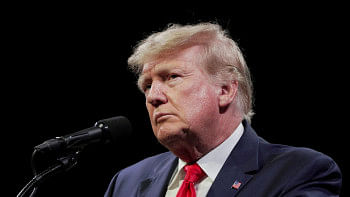Trump’s re-withdrawal from Paris Agreement

On the very first day of assuming office on January 21, 2025, US President Donald Trump signed an executive order to immediately withdraw the US from the Paris Agreement. His justification is that the agreement imposes an unfair burden on the US economy, and it favours other big emitters like China. This second-time withdrawal will take effect after one year. We may recall that Article 28.1 of Paris Agreement restricts exiting by any party after three years of its ratification date. Then it takes another year for the withdrawal to be finally effective. So, the last time Trump pulled out of the agreement, it ultimately took almost four years to take effect. However, it lasted only for four months—from November 2020 till President Joe Biden rejoined the treaty in early 2021.
This sad but expected news comes at a time when 2024 has been the hottest year on record. The global average temperature in 2024 reached 1.5 degrees Celsius above the pre-industrial levels—the aspirational goal under the Paris Agreement. The whole world is reeling from multifarious impacts of climate change: from the razing wildfires burning Los Angeles, to the devastating hurricanes in Southeast US, to torrential rainfall submerging Spain's Valencia, to floods in several districts in Bangladesh.
Global data from the last decade shows that developed countries in particular are being affected by the changing climate much more than before. The Global South has been suffering from climate change more severely, with their poor adaptive capacity. According to the 2024 UNEP Emissions Gap Report, the world is on its way to see up to 3.1 degrees Celsius warming by the end of this century. Before President Biden left office, he announced the new US goal to cut greenhouse gas (GHG) emissions by more than 60 percent from peak levels by 2035, a goal that would likely require a rapid transition away from fossil fuels. Currently, the US is the second largest emitter, contributing to around 13 percent of global emissions, but it is historically the largest contributor, with 25 percent of global share. So, it cannot shirk off its responsibility from solving the signature problem of runaway climate change.
On the domestic front, the US's re-withdrawal from the Paris Agreement will be accompanied by an aggressive roll-back of Biden-era environmental and climate initiatives, as was done during Trump's first term. But domestic politics and economics in the US is not likely to allow him to fully reverse the momentum of climate and renewable energy initiatives.
For example, the achievements under the Inflation Reduction Act and Bipartisan Infrastructure Law will continue to push clean energy forward while state, local and private sector leaders will carry the torch even farther. Elon Musk, Trump's close confidant, is avant-garde in producing and marketing electric vehicles for global markets. Unlike the federal government's non-leadership, 24 states have formed the bipartisan US Climate Alliance, which represents 54 percent of the US population and 57 percent of its economy, committing collectively to achieve net zero emissions in no later than 2050. Another area of bipartisan consensus that Congress passed and Biden signed is the ADVANCE Act, which will incentivise for developing new nuclear energy technologies.
But Trump's withdrawal is likely to have a more severe global impact than during its short-lived earlier exit. The US will remain away not just from the most open and public form of global diplomacy, but also lose its leadership in transitioning away from dirty fuels.
Second, the provision of climate finance will suffer the most, affecting acutely vulnerable low-income countries and small island developing states in particular. The US was the largest contributor, but Trump is bent on cutting all international climate finance, which will weaken global mitigation, adaptation and loss and damage actions. The ongoing reforms of the multilateral financial institutions led by the World Bank and aimed at ensuring a minimum level of climate justice are likely to stall, or progress at a snail's pace.
Mobilisation of private sector finance will heavily suffer as well. The US has the greatest influence on mobilising private and other forms of international finance, which are channelled to drive climate action. This is happening at a time when major European nations, such as France, Germany and the UK, are slashing their aid budgets.
With the absence of US leadership in climate diplomacy, European countries, China and other major economies of G20 are likely to play bigger roles. European countries, with their shrinking aid budget, may not be able to compensate for the US exit. Obviously, China is likely to step in, consolidating its lead role. It is currently the largest polluter, contributing around 30 percent of global emissions alone, but its historical share is about 12 percent since the First Industrial Revolution.
The Chinese vice-president, in his statement at COP29, said since 2016, China has provided over $24.5 billion to support climate actions in other developing countries. Also, the country pledged to expand its south-south climate cooperation fund, established almost a decade ago, to channel resources for promoting renewable energy, adaptation, and technology transfer to vulnerable countries. This support aims at bridging the gap left by unmet pledges from Western nations, including the US.
Though China still emits the most, its leadership in the renewable energy supply chain will further fuel protectionist backlash in Western countries. Several countries have imposed substantial tariffs on China's electric vehicles, including elimination of Chinese-processed metals from their factories. China is the world's largest producer of wind turbines, solar panels, lithium batteries and electric vehicles.
But the Western objection to classifying China as a developing country under the UNFCCC remains, because it is not obligated to contribute to climate finance, but only "encouraged" to do so under Article 9.2 of the Paris Agreement. Their argument is that China, as the second largest economy and the largest emitter, must share the global cost of its own pollution. With the expected lame duck role of the US delegation at the upcoming COP30, let's look forward to seeing the leadership stints to be played by major powers including China.
Mizan R Khan is technical lead at the LDC Universities Consortium on Climate Change (LUCCC).
Views expressed in this article are the author's own.
Follow The Daily Star Opinion on Facebook for the latest opinions, commentaries and analyses by experts and professionals. To contribute your article or letter to The Daily Star Opinion, see our guidelines for submission.


 For all latest news, follow The Daily Star's Google News channel.
For all latest news, follow The Daily Star's Google News channel. 





Comments